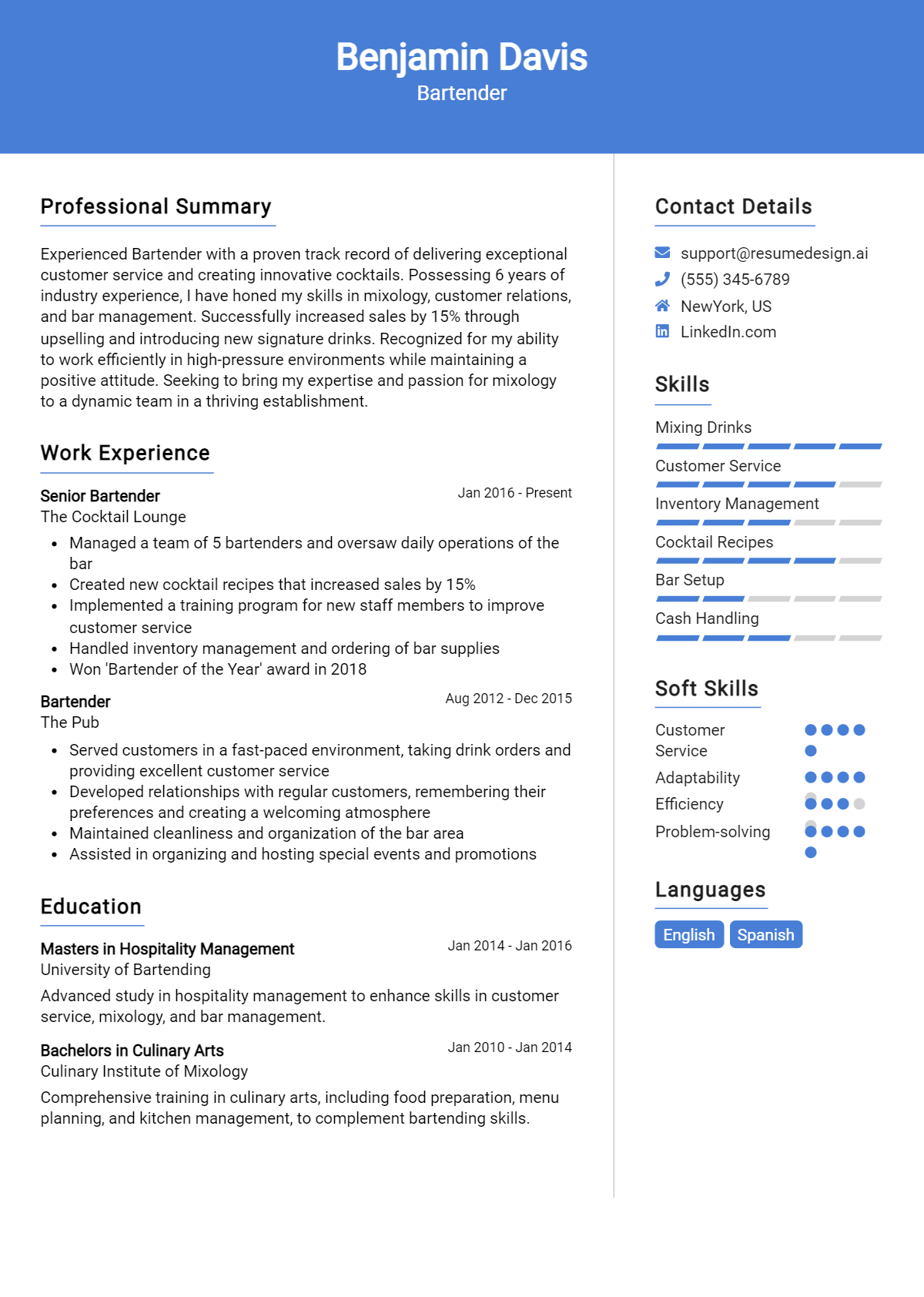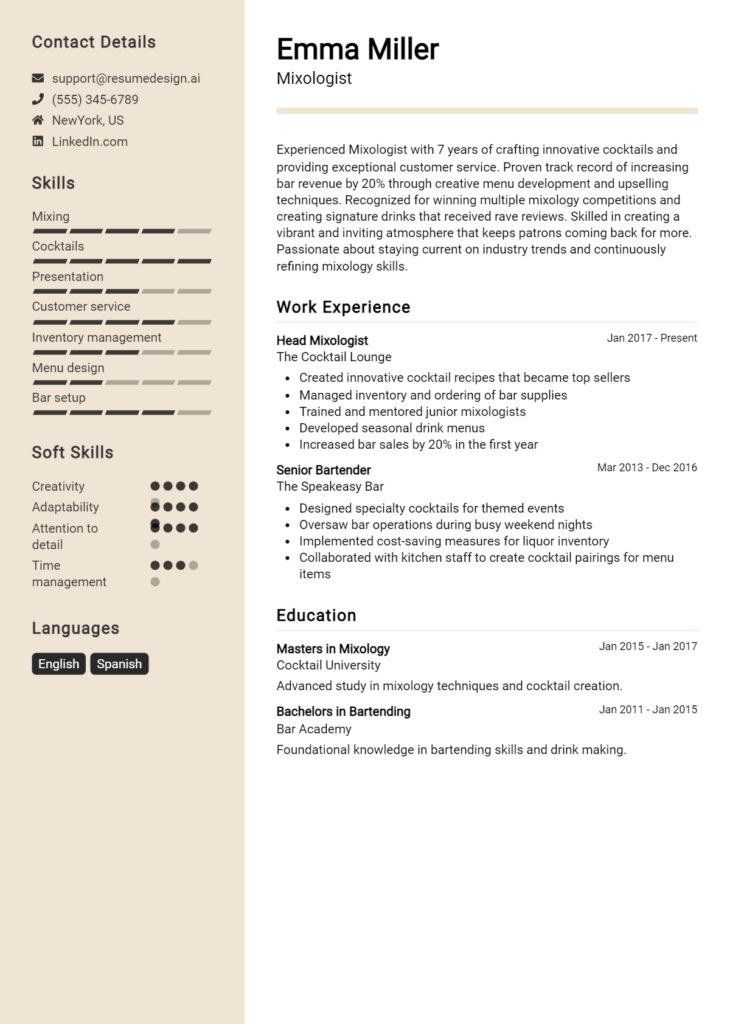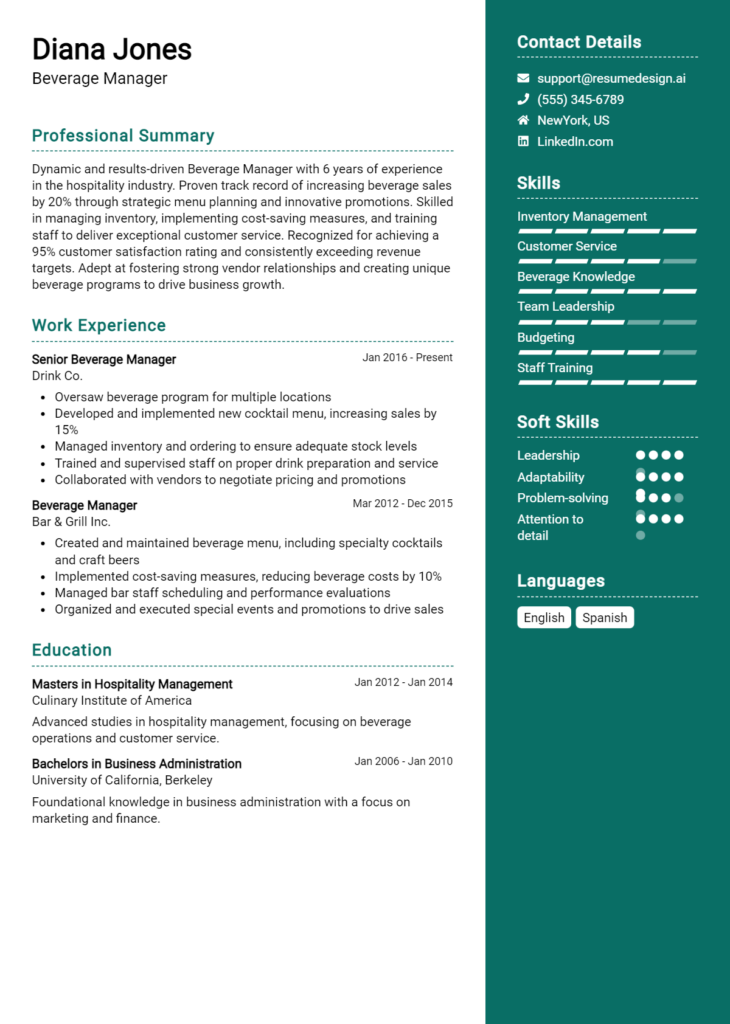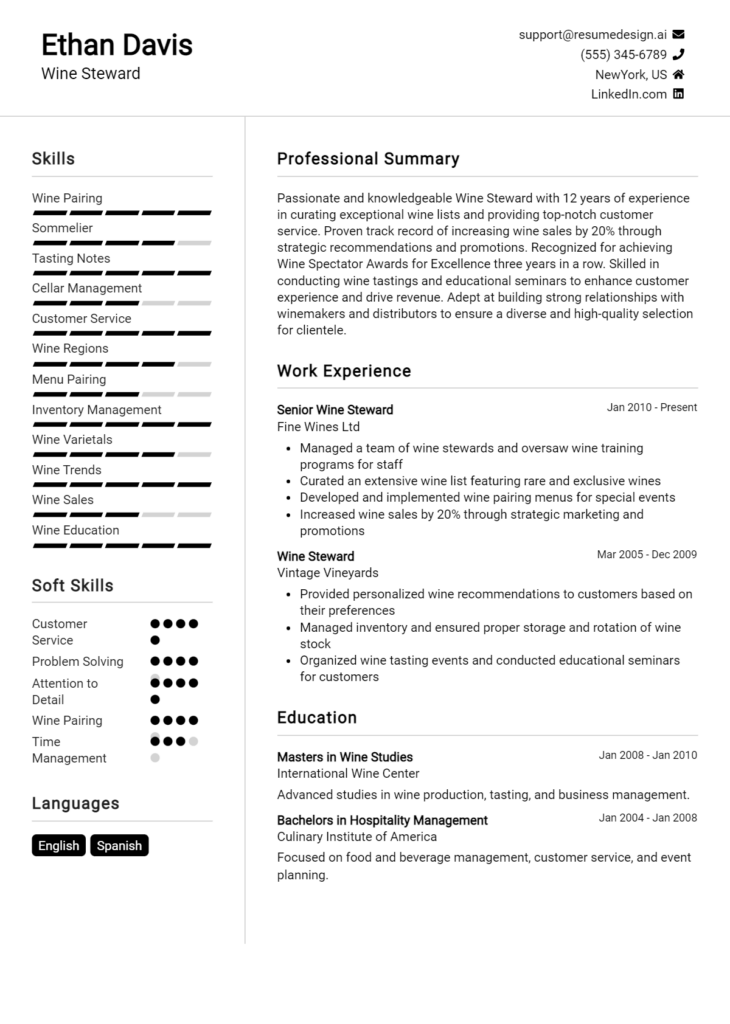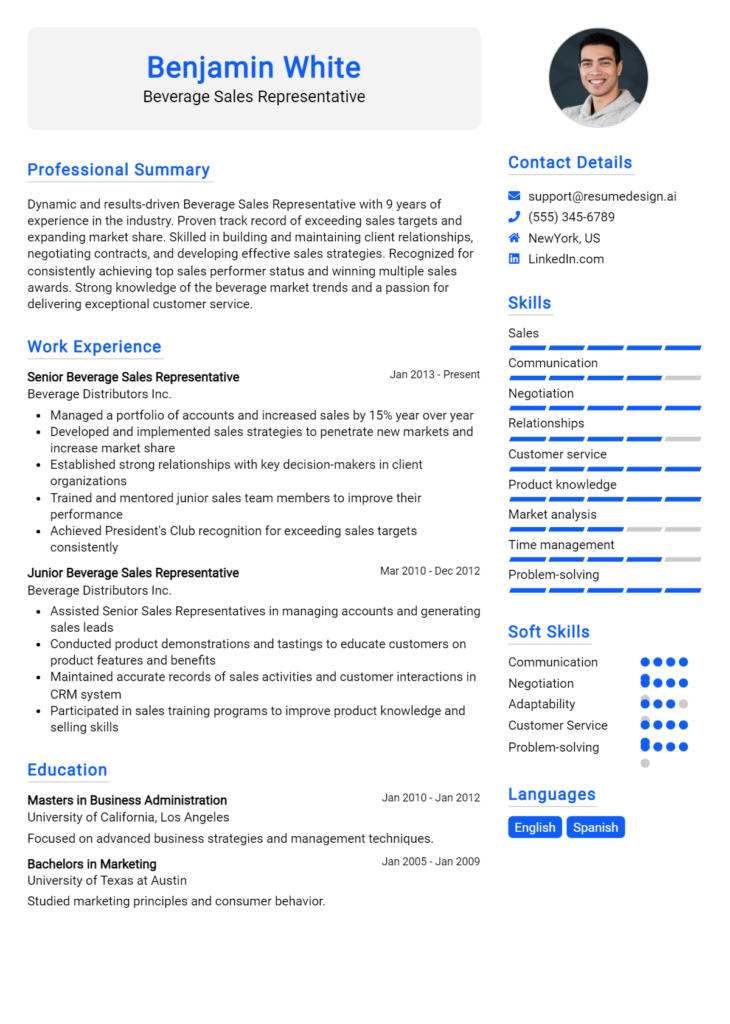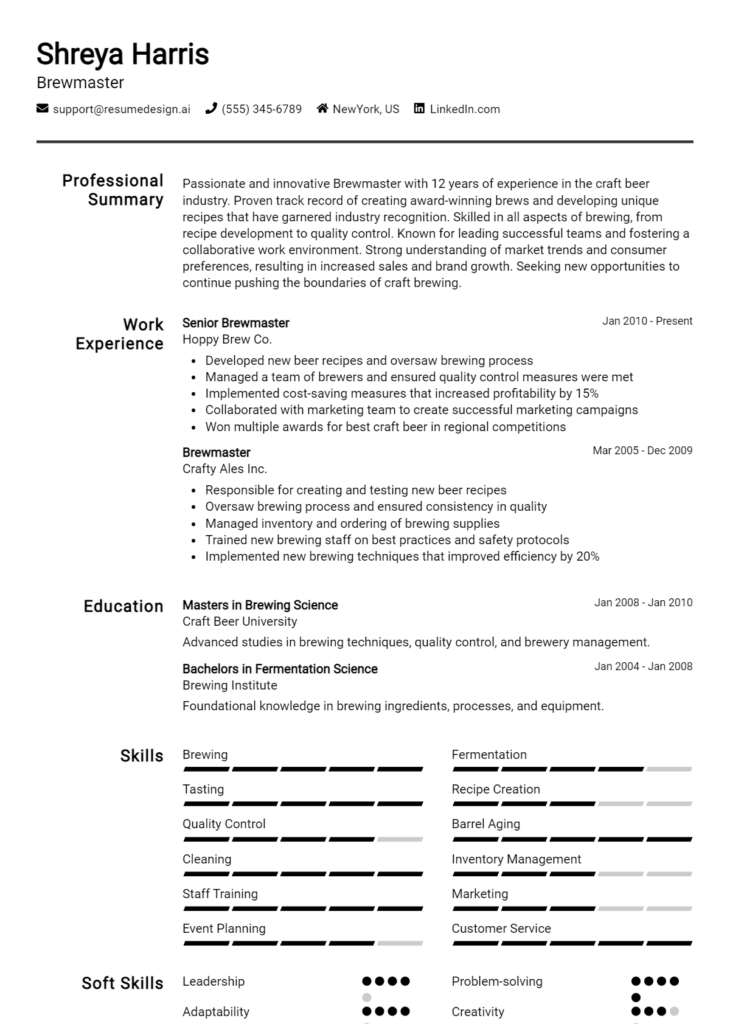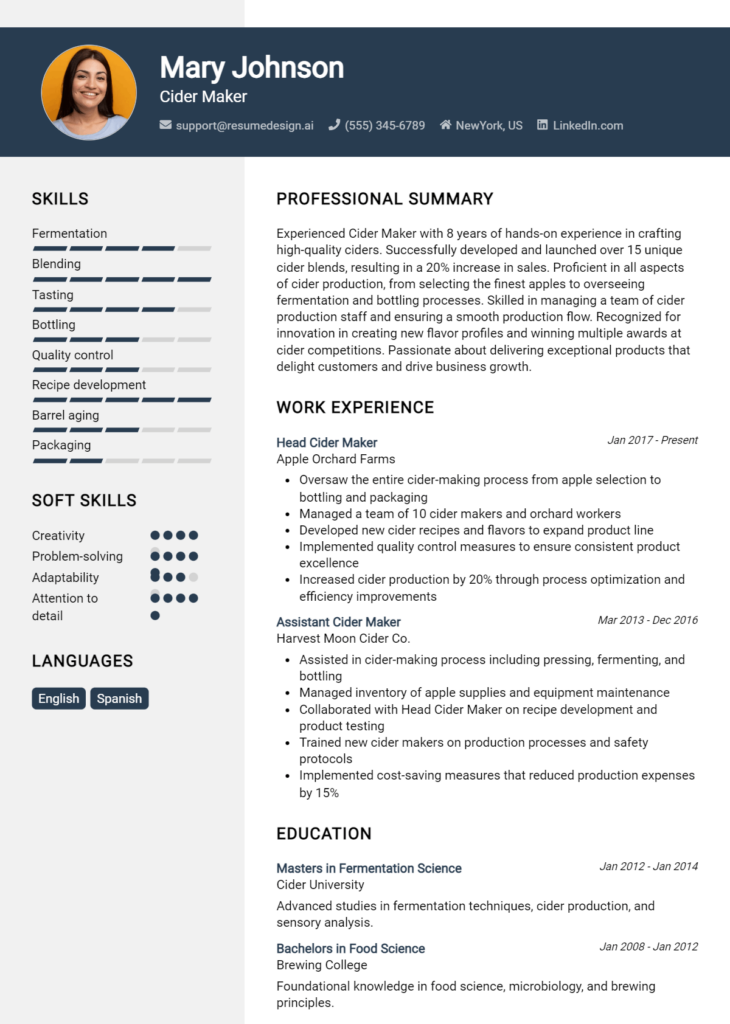Bartender Core Responsibilities
A Bartender plays a crucial role in the hospitality industry, serving as a bridge between patrons and the establishment. Key responsibilities include crafting cocktails, managing inventory, and ensuring compliance with safety regulations. Successful bartenders possess strong technical skills, operational efficiency, and exceptional problem-solving abilities to enhance customer experience. These competencies are vital for achieving organizational goals, such as customer satisfaction and profitability. A well-structured resume can effectively showcase these qualifications, making a candidate stand out.
Common Responsibilities Listed on Bartender Resume
- Mixing and serving alcoholic and non-alcoholic beverages
- Maintaining cleanliness and organization of the bar area
- Providing excellent customer service and engaging with patrons
- Managing cash and processing transactions accurately
- Stocking and replenishing bar supplies and inventory
- Creating and updating drink menus based on seasonal trends
- Adhering to health and safety regulations
- Training and mentoring new staff members
- Handling customer complaints and resolving issues promptly
- Collaborating with kitchen staff to coordinate service
- Monitoring alcohol consumption and ensuring responsible serving
- Participating in promotional events and marketing initiatives
High-Level Resume Tips for Bartender Professionals
In the competitive world of bartending, a well-crafted resume serves as your initial handshake with potential employers. This document is often the first impression you make, and it needs to effectively showcase not only your skills but also your achievements within the hospitality industry. A strong resume can set you apart from other candidates, highlighting your unique qualifications and experiences. In this guide, we will provide practical and actionable resume tips specifically tailored for Bartender professionals, ensuring that your application stands out in a crowded market.
Top Resume Tips for Bartender Professionals
- Tailor your resume to the specific job description by using relevant keywords and phrases.
- Showcase your bartending experience prominently, emphasizing previous roles and responsibilities.
- Quantify your achievements, such as the volume of drinks served or customer satisfaction scores.
- Highlight industry-specific skills, including mixology techniques, cocktail creation, and customer service excellence.
- Include any certifications, such as bartending school diplomas or responsible beverage service training.
- Utilize a clean and professional layout that is easy to read and visually appealing.
- Incorporate any awards or recognitions received, such as “Bartender of the Month” or participation in mixology competitions.
- Focus on soft skills like communication, teamwork, and adaptability, which are essential in a fast-paced bar environment.
- Keep your resume concise, ideally one page, to maintain the hiring manager's attention.
- Proofread your resume for any spelling or grammatical errors to reflect your attention to detail.
By implementing these tips, you'll significantly enhance your chances of landing a job in the bartending field. A well-structured and focused resume not only showcases your qualifications but also demonstrates your commitment to the craft, making you an attractive candidate to potential employers.
Why Resume Headlines & Titles are Important for Bartender
In the competitive landscape of bartending, where first impressions matter, a well-crafted resume headline or title serves as a crucial element in capturing the attention of hiring managers. A strong headline can succinctly summarize a candidate's key qualifications, showcasing their skills, experience, and unique attributes in a single impactful phrase. This concise statement not only highlights the candidate's suitability for the role but also sets the tone for the entire resume, making it essential for job seekers to create a headline that is both relevant and directly tied to the bartending position they are applying for.
Best Practices for Crafting Resume Headlines for Bartender
- Keep it concise: Aim for one impactful phrase that encapsulates your qualifications.
- Be role-specific: Tailor your headline to the bartending position and highlight relevant skills.
- Use strong action verbs: Begin with dynamic verbs that convey your expertise and energy.
- Include measurable achievements: If possible, reference specific accomplishments or metrics.
- Focus on unique selling points: Highlight what makes you stand out among other candidates.
- Avoid jargon: Use clear language that can be easily understood by hiring managers.
- Make it relevant: Ensure the headline aligns with the job description and requirements.
- Update regularly: Refresh your headline to reflect new skills or experiences as you grow in your career.
Example Resume Headlines for Bartender
Strong Resume Headlines
"Dynamic Bartender with 5+ Years of Experience in Craft Cocktails and Customer Service Excellence"
“Creative Mixologist Specializing in Unique Flavor Profiles and Seasonal Ingredients”
“Award-Winning Bartender with Proven Track Record in High-Volume Venues”
Weak Resume Headlines
“Bartender Looking for a Job”
“Experienced Worker in Hospitality”
Strong resume headlines are effective because they provide a clear, compelling snapshot of the candidate's qualifications, enticing hiring managers to read further. They highlight specific strengths and achievements, making the candidate memorable. Conversely, weak headlines fail to make an impression as they lack specificity and enthusiasm, leaving hiring managers with little motivation to continue reviewing the resume. By choosing powerful and relevant titles, candidates can significantly enhance their chances of standing out in a crowded job market.
Writing an Exceptional Bartender Resume Summary
A resume summary is a crucial element for any bartender looking to stand out in a competitive job market. This brief yet impactful section serves as the first impression on hiring managers, quickly capturing their attention by highlighting key skills, relevant experience, and notable accomplishments. A well-crafted summary not only showcases what the candidate brings to the table but also sets the tone for the rest of the resume. It should be concise, engaging, and tailored specifically to the job applied for, ensuring that it aligns with the expectations and requirements of the position.
Best Practices for Writing a Bartender Resume Summary
- Quantify achievements, such as the number of drinks served or customer satisfaction ratings.
- Focus on specific skills, including mixology, customer service, and cash handling.
- Tailor the summary to match the job description, using relevant keywords.
- Highlight any relevant certifications, like bartending school or mixology courses.
- Emphasize experience in high-volume environments or events, if applicable.
- Keep it concise—aim for 2-4 sentences that deliver maximum impact.
- Showcase any awards or recognitions received for exemplary service or innovation.
- Maintain a positive and professional tone that reflects your passion for the role.
Example Bartender Resume Summaries
Strong Resume Summaries
Dynamic bartender with over 5 years of experience in high-volume bars, consistently achieving a 95% customer satisfaction rating. Expert in crafting signature cocktails and managing inventory, leading to a 20% reduction in waste.
Detail-oriented mixologist with a passion for creating unique beverage experiences. Successfully increased bar sales by 30% during peak hours through innovative promotions and exceptional customer service.
Experienced bartender skilled in both classic and contemporary cocktails, with a track record of serving over 300 patrons per shift. Recognized for outstanding service with the 'Employee of the Month' award twice in one year.
Proficient bartender with extensive knowledge of wines and spirits, complemented by a bartending certification. Played a key role in a bar renovation that resulted in a 15% increase in foot traffic and overall sales.
Weak Resume Summaries
Bartender with some experience working in bars and restaurants. Good with customers and enjoys making drinks.
I am a bartender looking for a job where I can use my skills to serve drinks and interact with customers.
The strong resume summaries are effective because they provide concrete examples of achievements and specific skills that directly relate to the bartending role. They quantify results and highlight relevant experiences, making them memorable and impactful. In contrast, the weak summaries lack detail and specificity, making them generic and unremarkable. They fail to demonstrate how the candidate stands out or what unique value they can bring to a potential employer.
Work Experience Section for Bartender Resume
The work experience section of a Bartender Resume is crucial as it effectively highlights the candidate's technical skills, their ability to manage teams, and their commitment to delivering high-quality beverage products. This section serves as a platform for candidates to demonstrate their proficiency in cocktail preparation, customer service, and inventory management, all of which are essential in a fast-paced bar environment. By quantifying achievements and aligning their experiences with industry standards, candidates can provide compelling evidence of their capabilities, making them more attractive to potential employers.
Best Practices for Bartender Work Experience
- Highlight specific cocktail techniques and bar equipment proficiency.
- Quantify achievements, such as sales increases or customer satisfaction ratings.
- Showcase leadership roles, including team management and training initiatives.
- Detail experiences that demonstrate excellent customer service skills.
- Include examples of collaboration with kitchen staff and event planners.
- Align experiences with industry standards, such as knowledge of health and safety regulations.
- Use action verbs to create a dynamic narrative of your responsibilities and achievements.
- Tailor your work experience to the specific bar or restaurant you are applying to.
Example Work Experiences for Bartender
Strong Experiences
- Led a team of 5 bartenders during peak hours, resulting in a 20% increase in customer satisfaction ratings.
- Designed and implemented a seasonal cocktail menu that boosted sales by 30% over three months.
- Trained 10 new staff members on cocktail preparation techniques, improving service efficiency by 25%.
- Managed inventory for a high-volume bar, reducing waste by 15% through effective stock control measures.
Weak Experiences
- Bartended at a local bar for a few years.
- Made drinks and served customers.
- Worked with other staff members occasionally.
- Responsible for cleaning the bar area.
The examples of strong experiences are considered effective because they provide specific, quantifiable outcomes that illustrate the candidate's impact on their workplace, showcasing both technical skills and leadership capabilities. In contrast, the weak experiences are vague, lacking detail and measurable achievements, which fail to convey the candidate's true potential or contributions to previous roles.
Certifications and Education for a Bartender Resume
When crafting a resume for a bartender position, showcasing relevant certifications and education can significantly enhance your appeal to potential employers. Here are some guidelines on how to effectively list these qualifications:
Certifications to Prioritize:
- Responsible Beverage Service Certification: This certification demonstrates your understanding of responsible alcohol service, including recognizing signs of intoxication and the importance of checking IDs.
- Bartending Certification: Completing a bartending school or program can provide you with practical skills and knowledge about drink recipes, techniques, and customer service.
- Mixology Certification: A specialized mixology program can deepen your knowledge of crafting cocktails, understanding flavor profiles, and mastering advanced mixology techniques.
- Food Handler’s Certification: While primarily focused on food safety, this certification shows your commitment to maintaining a safe and sanitary work environment, which is crucial in any bar setting.
Educational Background Examples:
- High School Diploma or GED: Most bartenders hold at least a high school diploma or equivalent, which is essential for demonstrating basic education.
- Associate Degree in Hospitality Management: This degree can provide a solid foundation in hospitality and customer service, making you a more attractive candidate for higher-end establishments.
- Bachelor's Degree in Culinary Arts or Beverage Management: For those looking to advance their careers, a degree in these fields can offer in-depth knowledge and skills that set you apart from the competition.
- Certifications from Bartending Schools: Mention any specific bartending schools you attended that are recognized in the industry, as these can provide you with a competitive edge.
When listing your certifications and education on your resume, ensure that you include the name of the institution, the certification or degree earned, and the date of completion. This structured approach will help potential employers quickly identify your qualifications and suitability for the bartender role.
Top Skills & Keywords for Bartender Resume
As a bartender, showcasing your skills on your resume is crucial to stand out in a competitive job market. Employers seek candidates who not only have the technical know-how to mix drinks but also possess the interpersonal skills necessary to create a welcoming environment for patrons. A well-crafted resume that highlights your skills can greatly enhance your chances of landing an interview. Whether it's your ability to handle high-pressure situations or your knack for building rapport with customers, emphasizing these attributes can make a significant impact. For a comprehensive understanding of how to effectively present your skills and work experience, it's essential to consider both hard and soft skills that are pivotal in the bartending profession.
Top Hard & Soft Skills for Bartender
Soft Skills
- Excellent communication skills
- Customer service orientation
- Problem-solving abilities
- Teamwork and collaboration
- Adaptability to fast-paced environments
- Attention to detail
- Active listening skills
- Time management
- Conflict resolution
- Positive attitude
Hard Skills
- Knowledge of drink recipes and mixing techniques
- Proficiency in operating bar equipment (e.g., shakers, blenders)
- Familiarity with alcohol laws and regulations
- Cash handling and point of sale (POS) system experience
- Inventory management
- Ability to create signature cocktails
- Understanding of food safety and hygiene standards
- Bar setup and breakdown
- Experience in managing bar inventory
- Knowledge of wine and beer varieties
Stand Out with a Winning Bartender Cover Letter
Dear [Hiring Manager's Name],
I am writing to express my interest in the Bartender position at [Bar/Restaurant Name] as advertised on [where you found the job listing]. With over [number] years of experience in the bartending industry and a deep passion for mixology, I am confident that my skills and dedication to excellent customer service will make me a valuable addition to your team. My goal is to create memorable experiences for every guest, ensuring they leave with a smile and a desire to return.
Throughout my career, I have developed a comprehensive knowledge of various spirits, wines, and cocktails, allowing me to craft exceptional drinks tailored to individual tastes. At [Previous Employer Name], I honed my abilities in a fast-paced environment, efficiently managing multiple drink orders while maintaining high standards of cleanliness and organization. My strong communication skills enable me to engage with patrons and create a welcoming atmosphere, ensuring that each guest feels valued and appreciated. Additionally, I am well-versed in handling cash transactions, managing inventory, and adhering to all health and safety regulations.
I am particularly drawn to [Bar/Restaurant Name] because of your commitment to [mention any specific aspect of the bar/restaurant, such as unique cocktail offerings, community involvement, or atmosphere]. I admire how you [specific detail about the establishment], and I believe my creativity and enthusiasm will align perfectly with your team's vision. I am excited about the opportunity to contribute innovative cocktail recipes and enhance the overall guest experience while working alongside talented professionals who share my passion for the craft.
Thank you for considering my application. I look forward to the possibility of discussing how my background, skills, and enthusiasm can contribute to the continued success of [Bar/Restaurant Name]. I am eager to bring my expertise in bartending and commitment to customer satisfaction to your esteemed establishment.
Sincerely,
[Your Name]
[Your Phone Number]
[Your Email Address]
Common Mistakes to Avoid in a Bartender Resume
When crafting a resume for a bartender position, it's crucial to present yourself as a skilled and professional candidate. However, many applicants make common mistakes that can undermine their chances of landing an interview. By avoiding these pitfalls, you can create a compelling resume that highlights your strengths and experience in the bartending industry. Here are some common mistakes to watch out for:
Generic Objective Statement: Using a vague or generic objective can make your resume blend in with the rest. Tailor your objective to reflect your specific goals and how they align with the bar’s vision.
Omitting Relevant Experience: Failing to include relevant bartending or hospitality experience can weaken your application. Be sure to highlight any previous roles that involved customer service, drink preparation, or bar management.
Ignoring Soft Skills: Bartending isn't just about mixing drinks; it also involves strong interpersonal skills. Neglecting to mention soft skills like communication, teamwork, and conflict resolution can leave out critical aspects of your candidacy.
Poor Formatting: A cluttered or unprofessional layout can distract from your qualifications. Use clear headings, bullet points, and consistent formatting to make your resume easy to read.
Typos and Grammatical Errors: Submitting a resume with typos or grammatical mistakes can signal a lack of attention to detail. Always proofread your resume or ask someone else to review it before submitting.
Excessive Length: A resume that is too long can overwhelm hiring managers. Aim for one page unless you have extensive experience that warrants additional length, and keep it concise and relevant.
Neglecting Certifications: If you have relevant certifications, such as TIPS or ServSafe, make sure to list them prominently. These credentials can set you apart from other candidates.
Not Tailoring for Each Application: Sending out the same resume for every job can be detrimental. Customize your resume for each position by incorporating keywords from the job description to show that you’re a suitable match.
Conclusion
As a bartender, the role encompasses a variety of responsibilities that go beyond just mixing drinks. Key points covered in the article include the importance of excellent customer service, a thorough understanding of drink recipes, and the ability to handle cash and manage inventory. Additionally, bartenders should possess strong communication skills and be able to work effectively in a fast-paced environment.
To stand out in the competitive bartending job market, it’s crucial to have a well-crafted resume that highlights your skills and experiences. Take a moment to review your Bartender Resume and ensure it showcases your strengths effectively.
To assist you in this process, consider utilizing available resources such as resume templates, which can provide a professional layout for your information. You might also find a resume builder helpful for creating a polished resume tailored to your experience. Additionally, don’t overlook the importance of a strong cover letter; check out cover letter templates to help you craft a compelling introduction to potential employers.
Now is the time to invest in your career—review your resume and make the necessary updates to increase your chances of landing that bartending position!

